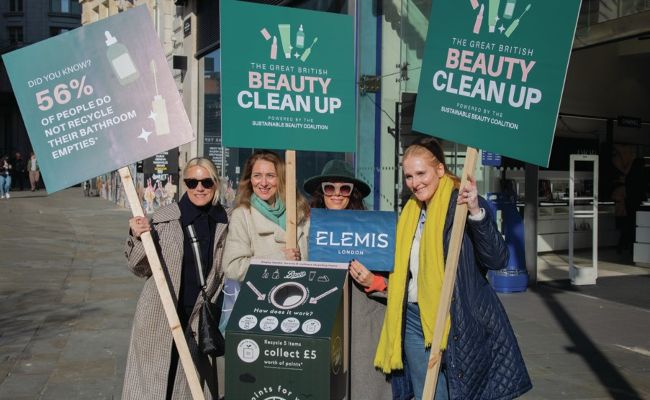ECO MATTERS
Beyond The Bottle
As plastic packaging tax rises, the beauty industry’s waste problem grows. Scratch explores solutions to help you do your part for the planet
As sustainability efforts take centre stage, businesses in the UK must navigate the evolving landscape of packaging regulations. The UK Plastic Packaging Tax (PPT), introduced in April 2022, was designed to incentivise the use of recycled materials in plastic packaging. The tax applies to plastic packaging containing less than 30% recycled content, set in 2023 at £210.82 per tonne. However, the PPT rate increased on 1 April to £223.69 per tonne, following last year’s Autumn Budget.
While the tax is levied on manufacturers and importers of plastic packaging, its impact extends beyond them. The rising cost of virgin plastics, increased demand for recycled materials and shifting regulations mean businesses across industries could see packaging costs increase. Even if a company does not directly pay the tax, suppliers may pass on higher costs, making it crucial for businesses to assess their packaging strategies. At the same time, restrictions on single-use plastics continue to tighten.
How can businesses adapt?
With sustainability now a financial and regulatory priority, businesses have several options to mitigate the impact of the Plastic Packaging Tax, such as switching to packaging with at least 30% recycled plastic and exploring alternative materials, like corrugated cardboard or biodegradable options. A reduction in overall packaging use can also be considered, alongside reusable solutions.
As demand for recycled plastic grows and the UK government continues to push for a circular economy (a focus on keeping products, materials and resources in use for as long as possible), businesses must stay ahead of these shifts. Whether through compliance, innovation or sustainability-driven strategies, companies that adapt early will be in the best position to thrive in a changing marketplace. However, it may not be entirely straightforward.

Victoria Brownlie MBE
“Companies that fall within the criteria of paying the tax have spoken of challenges around costs to transition to recycled plastic, and the availability and affordability of alternative materials,” shares Victoria Brownlie MBE, chief policy and sustainability officer at the British Beauty Council (BBCo). “Some have suggested that the cost of recycled plastic has increased by several hundred percent, making it cheaper for them to pay the tax rather than implement environmental change via the use of less impactful materials.
“Unfortunately, the tax and/or implications of using more expensive packaging materials will most likely be felt by the consumer, as well as small businesses and salons that larger companies supply to. We need to drastically scale investment and innovation in sustainable alternatives to replace the reliance on virgin plastic. The BBCo’s belief is that no single beauty and personal care company can do this alone, and this is why it has facilitated a Plastic Solutions Summit for the last three years. The Summits open conversations and explore how we can better collaborate as an industry, to find faster, far-reaching solutions.
“All businesses across beauty and personal care – including the vibrant nail sector – can make changes, and the Council’s Planet Positive Beauty Guide is a great place to start.” Scan to view thePlanet Positive Beauty Guide
The power of choice
Here’s how brands, distributors and nail professionals can make a shift towards sustainable packaging and practices, while maintaining quality and profitability:
Distributors
• Request recycled plastic certifications from suppliers and prioritise brands that are PPT-compliant to avoid tax-related price hikes.
• Offer biodegradable nail wraps, glass-packaged nail oils and paper-based packaging solutions.
• Clearly label products with recycled content information, and help salon owners understand which products are exempt from the tax.
Nail professionals
• Ensure bottles, caps and tubes for gel polishes, acrylic powders, removers and lotions contain recycled content.
• Work with suppliers to confirm the origin and percentage of recycled materials.
• Consider glass bottles for polishes, oils and cuticle products; biodegradable plastics for single-use items and aluminium or tin for removers and creams.
• Offer salon-sized refillable bottles for professional use and create customer refill stations for polish removers and cuticle oils.
• Consumers value eco-friendly choices, so highlight the use of recycled plastic or sustainable materials on packaging and marketing.
• Choose metal tools over plastic, silicone nail soakers for gel removal and eco-friendly cotton pads instead of synthetic wipes. Also swap plastic aprons and gloves for biodegradable options.

The Great British Beauty Clean Up
Led by the Sustainable Beauty Coalition in partnership with the BBCo, The Great British Beauty Clean Up is an initiative to promote sustainability within the beauty industry. The campaign emphasises the key principles of Reduce, Reuse, Refill and Recycle, encouraging consumers to actively engage in the responsible disposal of beauty packaging.
It also serves to increase recycling rates of beauty empties by spotlighting take-back schemes and household recycling where available. The BBCo is directing consumers to existing recycling schemes across the UK via an interactive map on its website. The launch coincides with BBCo research, which reveals that 65% of beauty professionals are unaware of organisations or initiatives supporting waste reduction and sustainability within the professional beauty industry.
www.britishbeautycouncil.com/recycling-points
“The beauty industry generates over 120 billion units of packaging annually, contributing to one-third of global landfill waste, and 70% of plastic waste within the beauty sector is unrecycled.”
The Courage to Change Report
, commissioned by the British Beauty Council
Spotlight on… Green Salon Collective
Green Salon Collective (GSC) provides sustainable solutions to turn salon waste into valuable resources. Whether used nail foils, PPE, plastic, paper or salon towels, GSC ensures that no waste ends up in landfill, through composting, recycling, recovery and energy generation.
GSC helps salons easily integrate environmentally friendly practices into day-to-day operations with starter kits, next-day collection services and ongoing support. It also provides educational materials that cover all aspects of salon sustainability, from waste management to eco-friendly products. www.greensaloncollective.com
DID YOU KNOW?
Funding of around £5bn is available to help UK businesses become greener, as part of the government’s commitment to reach net zero emissions by 2050. Scan to learn more
Scrummi
The brand offers eco-friendly, disposable towels and biodegradable products that help eliminate laundry, cut costs and protect the planet. Scrummi’s towels are made from natural wood fibres that safely break down after use, leaving no residues or microplastics behind.
www.scrummi.com
Botella
Post-Covid, rising costs encouraged Jodie Whitehead-Booth, owner of Whitehead & Booth Salon, Sheffield, to downsize to a more efficient salon space. It features reclaimed timber flooring, upcycled furniture and a nail bar crafted from repurposed scaffolding boards. “These changes inspired us to tackle a much bigger issue in the nail industry: plastic waste,” Jodie shares, and the pro created the Botella range of glass bottles in 2022. “Unlike plastic, glass is infinitely recyclable without degrading in quality,” Jodie continues. “It eliminates the risk of microplastic contamination, preserves product integrity and offers a luxurious, durable alternative to plastic packaging.”
www.botella.uk
SUSTAINABLE SOLUTIONS
Light Elegance
“Courier health & safety requirements can sometimes restrict packaging options, however we make every effort to reuse packaging and use eco-friendly materials, such as dissolvable packing peanuts and tissue paper,” shares Jo Wickens, Light Elegance UK co-owner & head of education. “One of the most effective ways for salons to reduce plastic waste and other non-recyclable materials is by switching to refillable gels. Light Elegance offers 120ml refill tubes, which can be used to top up smaller tubs, significantly cutting down packaging waste, while being cost-effective.”
www.lightelegance.co.uk
Sweet Squared
“We’re actively seeking more domestic suppliers to work with, in order to support local businesses and strengthen our sustainability initiatives,” comments Samuel Sweet, co-founder of Sweet Squared, and Sean McQuillan, the company’s head of supply chain. “By collaborating closely with our suppliers, we’ve avoided and absorbed the impact of the Plastic Packaging Tax and operate with three practices in place:
• Sustainable mobility. Our entire fleet is electric, drastically cutting emissions and supporting clean energy.
• Eco-friendly packaging. We’ve eliminated plastic packaging, opting for biodegradable, recyclable or sustainably sourced materials like cardboard and paper.
• Renewable energy. Our facilities run on solar power, generating over 90% of our electricity and reducing dependence on non-renewable sources.
“To reduce plastic waste, salons should opt for larger product sizes and consolidate purchases, as ordering less frequently reduces their carbon footprints. Fewer suppliers also ensures a smaller environmental impact.”
www.sweetsquared.com
Andreia Professional
“We have increased the amount of post-consumer recycled (PCR) plastic content and explored the potential of plant-based plastics across our portfolio,” explains Serafirm Duarte, quality assurance & regulatory affairs director at Andreia Professional. “Wherever possible, we are transitioning away from conventional plastic packaging. However, we have encountered several challenges in sourcing viable alternatives. These include limited availability of proven, sustainable packaging options, untested packaging, higher costs associated with plant-based plastic and longer delivery times.”
www.andreiaprofessional.com /www.salon-services.com